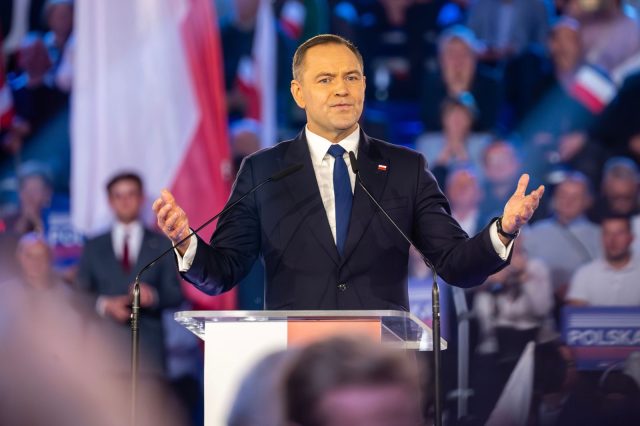
Against all odds, with a quiet yet powerful comeback, Karol Nawrocki has won the Polish presidential runoff, upsetting Prime Minister Donald Tusk’s pro-EU agenda and opening a new chapter in the country’s political history. This victory reaches far beyond national borders—it’s an earthquake that shakes Brussels, scores a point for the Europe of nations, and brings the issue of sovereignty back to the forefront.
The Duel: Nawrocki vs. the Establishment
In the first round, when polls showed pro-European Warsaw Mayor Rafał Trzaskowski ahead and celebrated by the media and establishment, it seemed the outcome was all but certain. Charismatic, multilingual, backed by international elites and strongly supported by PM Tusk, Trzaskowski was portrayed as the modern, forward-looking face of Poland.
On the other side stood Karol Nawrocki, the candidate for the conservative Law and Justice Party (PiS), underestimated and mocked. A Catholic, amateur boxer, and historian with a PhD on communism, Nawrocki had led the Institute of National Remembrance and was painted as the “wrong man” by much of the Western press. Yet Nawrocki’s message was clear: less Brussels, more Warsaw. Less ideology, more homeland.
The Nighttime Comeback
After the first round, everything pointed to a pro-European win. But on the night of the runoff, while Trzaskowski prematurely celebrated based on exit polls, Nawrocki warned: “We will win in the night and save Poland.” Prophetic words.
Official results from the National Electoral Commission confirmed a narrow but meaningful victory: 50.89% to 49.11%. A handful of votes overturned expectations—enough to crush Tusk’s dream of a partisan president. Turnout, a record-breaking 71%, confirmed that Poles understood how pivotal this election was.
The People vs. the Elite
The electoral map shows a divided country: Trzaskowski dominated big cities, while Nawrocki won in rural areas, the east, and the most populous voivodeships. Young voters under 40 and seniors over 60 supported Nawrocki—a sign that his message of national dignity resonated. This wasn’t just a battle between two candidates; it was a clash between two visions: a technocratic European future versus a sovereign homeland.
Populism, long despised by elite circles, stopped asking for permission and slammed its fist on the table. Nawrocki spoke to the “deep Poland”—those who work, pray, save, raise children, and have no time for rainbow utopias and climate impositions.
A Bitter Defeat for Tusk
Donald Tusk is the true loser. The man who sought to re-align Poland with Brussels now faces a president willing to use his constitutional veto power to block liberal-progressive policies. As with his predecessor Andrzej Duda, Nawrocki can and likely will resist the ideological drift of the current government. And Tusk lacks the parliamentary majority needed to override a veto.
Tusk’s response was telling: he announced a confidence vote in parliament, a clear attempt to save face and hold on to power. But the message from the polls is unmistakable—Poles are tired of surrendering their sovereignty and obeying directives from Brussels and Berlin.
Europe Shaken, Realpolitik Adjusts
Nawrocki’s victory calls into question the narrative of an inevitable federal Europe. Despite early alarm and criticism, even Ursula von der Leyen was forced to adjust her tone, expressing “trust in continued cooperation with the new president” and emphasizing Poland’s importance in a “stronger Europe.” Carefully chosen words, dictated by Realpolitik—she knows that a country of 38 million at Europe’s heart, a NATO pillar on the eastern flank, cannot be ignored.
Even Donald Trump welcomed the result: “Trump’s loyal ally wins in Poland, shaking all of Europe. Congratulations Poland, you chose a winner!” Nawrocki now joins a growing front of patriotic leaders aiming to reform Europe from the ground up—asserting the role of nations against supranational centralism.



 Subscribe
Subscribe